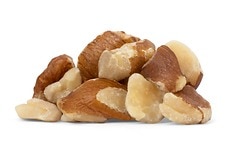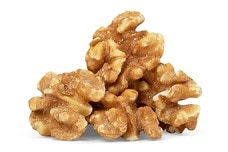Benefits of Walnuts
Several species of trees around the world produce walnuts, although the walnuts we most often enjoy in the United States are English walnuts. Walnuts are actually the fruit of trees from the Juglans genus; they can be savory or sweet depending on how they are processed (WHFoods, 2014). This makes walnuts an incredibly versatile fruit. They taste great candied and placed atop cakes, baked into healthy cookies, or in a banana walnut bread. Alternatively, walnuts can be an addition to savory foods, as walnut burgers, a crunchy accompaniment to chicken, or ground into a flavorful pesto. Whether you’re making breakfast, lunch, dinner, or a snack, walnuts are a great go-to choice.
In addition to their versatility, walnuts are a healthy food. They are full of beneficial vitamins and minerals that promote overall health. Consider some of the following benefits of these delicious nuts:
Walnuts are High in Protein
Protein is one of three macronutrients your body needs to thrive (carbohydrates and fats are the other two). Incorporating protein into your diet not only helps your body rebuild its tissues, but it also triggers feelings of satiety. This means that you will not be reaching for an unhealthy snack just an hour after your meal.
Walnuts are an excellent source of protein, containing 4 grams of protein per ounce (Self Nutrition Data, n.d.). Although walnuts are not a complete protein, they contain many of the essential amino acids your body requires. The protein in walnuts is broken down into these component amino acids, which are then used to support physiological processes such as muscle repair.
Walnuts are a Vegan Source of Omega-3 Fatty Acids
Omega-3 fatty acids have gained considerable attention in the past few decades for their role in cardiovascular functioning. Getting enough omega-3 fatty acids lowers your risk of heart disease, arthritis, and certain types of cancer (Erlich, 2015). Additionally, omega-3 fatty acids are associated with an anti-inflammatory response in the body. Given their high concentration in the brain, they may also support cognitive health and protect against dementia.
Your body cannot synthesize omega-3 fatty acids on its own, meaning that you must get these healthy fats through your diet. Some of the best sources of omega-3 fatty acids are fish, which makes it challenging for vegetarians or vegans to get enough. Walnuts are an excellent vegan source of omega-3 fatty acids. In particular, they are full of alpha-linoleic acid (ALA), which can be converted into two other beneficial forms of omega-3s, DHA and EPA.
Walnuts Contain High Amounts of Fiber
Dietary fiber helps your body maintain gastrointestinal regularity, promotes stable blood sugar, and maintains healthy cholesterol levels (Mayo Clinic, 2015). Walnuts are a great way to bump up your fiber intake. Just one ounce of walnuts contains 1.9 grams of fiber, putting you one step closer to reaching your daily goal.
Walnuts are High in Phosphorus
Phosphorus exists through the human body as a major structural element in bones and cellular membranes. Getting enough phosphorus promotes strong bones and teeth, particularly when consumed with a source of calcium. Walnuts contain 97 mg of phosphorus per serving (10% of the Daily Value (DV) for the mineral) as well as 27 mg of calcium, making them a smart snack selection for supporting bone health (Calvo, 2014).
Bioavailable Vitamin B6
Sometimes, it is not just the amount of a vitamin or mineral you receive, but how well it can be used. Certain vitamins, such as vitamin B6 (pyridoxine) can be more difficult for your body to absorb in their typical forms. Many fruits, vegetables, and grains are high in vitamin B6, but it exists in a glycosylated form (Office of Dietary Supplements, 2015). This makes it difficult for your body to take up and use the vitamin, reducing its bioavailability.
Although walnuts do not contain as much vitamin B6 as some other foods, the form the vitamin takes is more readily absorbed by the body. Thus, walnuts are an excellent way to get enough of the vitamin B6 you need (WH Foods, 2014). Each ounce of walnuts contains 0.2 micrograms of vitamin B6, representing 8% of the DV for the nutrient. Getting enough of this vitamin is associated with lower risk of cardiovascular disease, cancer, cognitive impairment, and other chronic health problems (Office of Dietary Supplements, 2015).
Recipes with Walnuts
The following foods include the scrumptious savor of walnuts as part of their wholesome palate. Find your favorite to enjoy the benefits discussed above in each delectable dish.
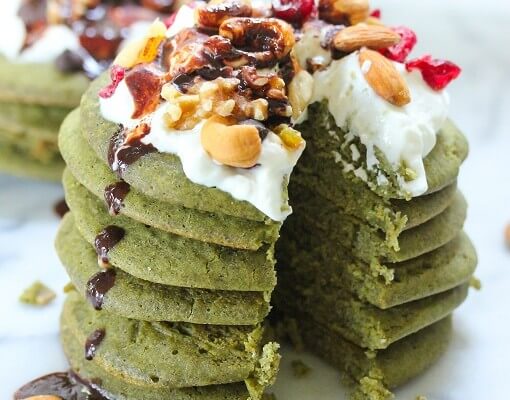
Matcha Green Tea Pancakes Recipe {gluten-free}
Start the day the right way with these scrumptious matcha green tea pancakes. In addition to including the unique taste of matcha, these flapjacks are topped with an assortment of sweet savors to supply a taste that’s suitable for breakfast or dessert!
Ingredients: Almond milk, brown rice flour, egg, sugar, coconut oil, matcha green tea powder, hemp protein powder, butter, greek yogurt, walnuts, almonds, banana chips, cranberries, golden raisins, maple syrup, cacao powder, baking powder.
Total Time: 15 minutes
| Yield: 9-10 pancakes
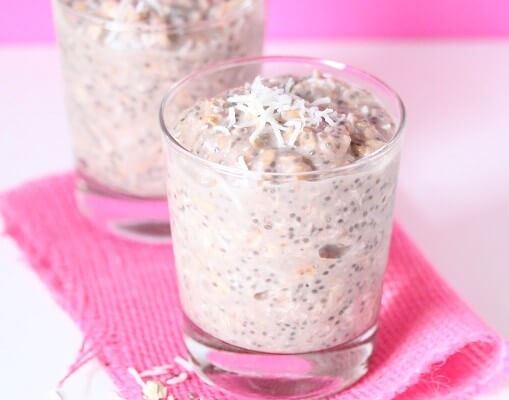
Strawberry and Banana Overnight Oats Recipe
An alternative means of adding the nutritious nuts to your breakfast plate, this sweet dish is easy to prepare ahead of time for a quick bite you can grab as you head out the door. Enjoy the rich flavors of strawberry and banana with this delightful oatmeal today!
Ingredients: Gluten-free rolled oats, chia seeds, walnuts, unsweetened shredded coconut, fresh or frozen strawberries, ripe bananas, agave or maple syrup, almond milk.
Total Time: 15 minutes
| Yield: 10 - 12 servings
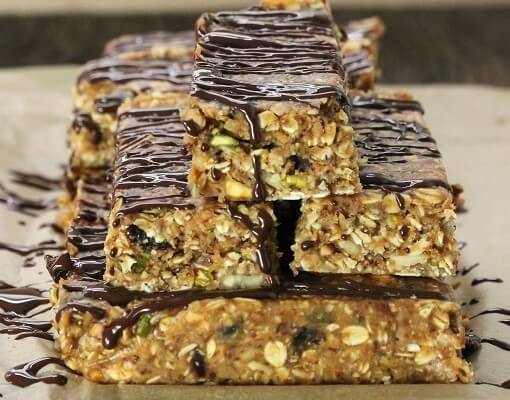
No-Bake Granola Bars Recipe {gluten-free, vegan}
A simple granola bar that serves as a satisfactory anytime snack, these collations contain seeds, nuts, and fruits to offer a full flavor and soft, chewy texture. Stave off hunger between meals with the nutrients you need and make a batch of these delightful confections for the week!
Ingredients: Gluten-free rolled oats, peanut butter, dried tart cherries, pistachios, flaxseed meal, walnuts, pumpkin seeds, sunflower seeds, agave syrup. unsweetened applesauce, melted cacao nibs or dark chocolate.
Total Time: 15 minutes
| Yield: 8 - 10 servings
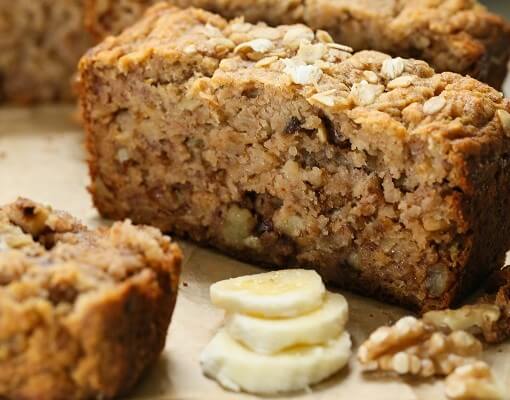
Banana Bread Recipe {gluten-free}
This loaf is not only gluten-free, but also supremely soft with a subtle crunch you’d come to expect from a scrumptious banana bread. Enjoy this snack on its own or with a spread of your favorite nut butter for an added boost of protein.
Ingredients: Overripe bananas, eggs, coconut oil, applesauce, almond milk, honey, vanilla extract, brown rice flour, coconut flour, walnuts, gluten-free rolled oats, baking soda, baking powder.
Total Time: 1 hour
| Yield: 12 servings
Walnuts Ready for Snacking
We have an expansive assortment of walnuts that you can find here, but you can also find a sample of these nuts in several forms below.
Healthy Eating
- Healthy Snacks
- Healthy Meals
- Healthy Recipes
- Sports Nutrition
- Nutrition and Special Diets
- 21 Day Fix
- 5 Popular Diet Similarities
- Alkaline Diet
- Anti-Inflammatory Diet
- Calorie Counting
- Carb Cycling Diet
- Celiac Disease
- Cholesterol
- Clean Eating
- Crohn's Disease
- DASH Diet
- Detox Diet
- Diabetes
- Diabetes Diet
- Diet Pill Dangers
- Fat Burning Foods
- Gluten-free Diet
- Glycemic Index
- Heart Health
- High Blood Pressure Diet
- High Fiber Foods
- How to Eat Healthy
- How to Lower Blood Pressure
- Hypertension
- IBS Diet
- Ketogenic Diet
- Liquid Diet
- Low GI Foods
- Low-Carb Diet and Foods
- Low-Fat High-Carb Diet
- Mediterranean Diet
- Mediterranean Diet Foods
- Military Diet
- Nutrition Labels Explained
- Paleo Diet
- Raw Food Diet
- Superfoods
- Sustainable Weight Loss
- Thrive Diet
- Vegan Diet
- Vegetarian Diet
- Weight Loss Shakes
- Whole30
- Vitamins, Minerals & Nutrients

